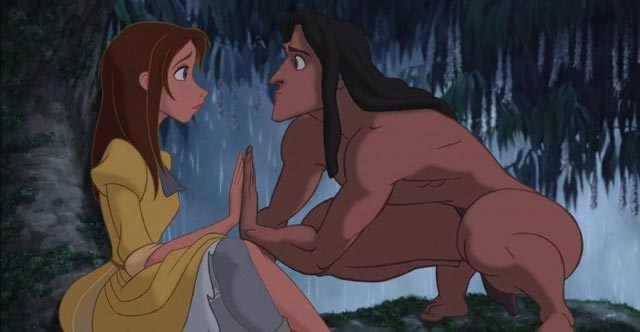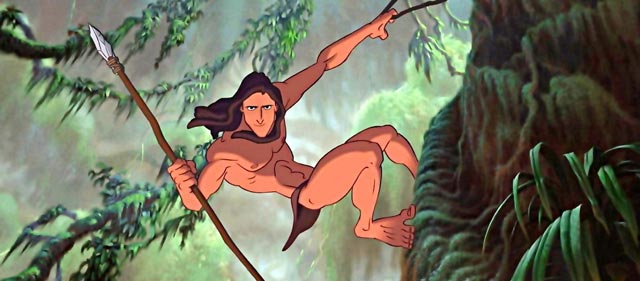"Tarzan": A Traditional Disney Movie Take on the Classic Tale
 |
| "Tarzan" (1999). |
"Tarzan" (1999), directed by Chris Buck and Kevin Lima, was the final triumph of the Renaissance, earning $448 million to turn a tidy profit despite "Tarzan"'s record $130 million budget. If one looked closely enough, though, the signs of trouble were brewing. Instead of tackling classical fairy tales and original interpretations of more recent novels, Disney movies were sliding into a pit of unoriginality.
After the criticism it had taken from various pressure groups for "Pocahontas" and "Mulan" (though not necessarily as a result), Disney plotted out its next three movies as straightforward adaptations of safe material that had been done to death in other venues: "The Hunchback of Notre Dame," "Hercules" and now "Tarzan."
 |
| I like the classic look of this version of the "Tarzan" poster. |
 |
| Making a new friend in the jungle. |
A 19th century English couple is stranded in the African jungle after fleeing their burning ship. They build a treehouse to care for their infant son but are killed by villainous leopard Sabor. A female gorilla whose own son recently died, Kala, hears the infant's cries and takes him away before Sabor can kill him, too. Kala brings him home and raises him despite the disapproval of her mate, Kerchak. Kala names him Tarzan.
The time comes for the explorers to leave, and Clayton is desperate to capture the gorillas and put them on display in England, so he convinces Tarzan that Jane will stay with him if Tarzan just shows him where the gorillas live. Tarzan falls for it and takes them there, but Kerchak tries to attack the Clayton and the others. Tarzan intervenes so the people can escape, and then Kala takes him to the old treehouse and shows him his past.
She convinces Tarzan to leave with Jane and the Professor, but when he goes back to the English, Clayton leads a troop of pirates to capture them and locks them up in the ship. Tarzan frees himself and goes to get Kerchak, who returns with Tarzan to take care of Clayton. The guide, though, shoots Kerchak and chases Tarzan into the jungle. They have an epic fight among the vines of the towering trees, and when it is over, the dying Kerchak names Tarzan to be the leader of his gorilla family. Jane must then decide if she wishes to return to England with her father or stay in Africa with the man she loves.
Minnie Driver, at that time a rising young actress because of hits including "Good Will Hunting," voices Jane with a lot of ad-libs, and Glenn Close is appropriately maternal as Kala. Lance Henriksen as Kerchak and Nigel Hawthorne as Professor Porter round out the leads, with Rosie O'Donnell cast in the usual animated Disney movie comic-relief role as Terk, a wisecracking (what else) friend of Tarzan. While several of these actors might be considered "A-List," at least at the time, there is nobody who really takes over and dominates the film like a Robin Williams or a James Woods, and that is what a routine adaptation of a hackneyed story really needs to light it on fire. The studio apparently thought that the famous title alone would be enough to sell this movie, about which they were absolutely correct, but then one wonders where the huge budget went.
 |
| Jane is a bit of a looker, eh? |
 |
| Mimicking the guy with the gun is usually a bad idea, but Jane likes it. |
Giving the film a contemporary pop feel was a nice break from the sometimes depressing classical sounds of films like "The Hunchback of Notre Dame," though fans of Alan Menken might disagree. Collins' songs help pull the story forward rather than halt it in its tracks with show-stoppers, which nicely complements the fluid story and animation. The pop sound of Collins' songs, though, does jar a bit with the conventional background music by Mark Mancina. Several of the Collins songs sound very reminiscent of his '80s hits.
If there is a fault to "Tarzan," it is that it is a little too smooth and polished. The entire backstory is compressed into a brilliant ten minutes at the start, just like in "The Lion King," and you have the standard musical interludes which were a hallmark of Disney movies in the 1990s and became increasingly rare in the 2000s. There is the inevitable comic sidekick (Jason Alexander did that to perfection in "Hunchback of Notre Dame), and that is about it for the comedy, another stylistic flourish of the Disney Renaissance. Later films would increase the comedy, probably to compete with the likes of competing franchises like DreamWorks' mega-successful "Shrek" series, but here it is restrained (though Rosie O'Donnell is usually not called that).
There also are quiet, emotional moments, not something you find much of in later films. Disney movies moved away from this very successful formula after this, and no doubt did that for a very good reason. How you feel about "Tarzan" likely will depend on whether you prefer the Disney movie classics like "Beauty and the Beast," which have a Broadway air to them, or the more recent series such as the "Ice Age" line of films, which are fast-paced, jokey, full of comic characters invariably doing funny things, full of sly topical references, and with serious reflection present but confined to small, discrete plot points. "Tarzan" definitely falls in the former camp.
"Tarzan" was released to home video in 2000, both in a single DVD version and a two-disc Collector's Edition," with another single-disc version released in 2005. There were two direct to video sequels, "Tarzan & Jane" (2002) and prequel "Tarzan II" (2005). There is a Blu-ray edition that came out in Europe in 2012, but it may be difficult to find.
 |
| Yes, our boy does swing on those vines. |
Below is the original trailer for "Tarzan."
2020












No comments:
Post a Comment